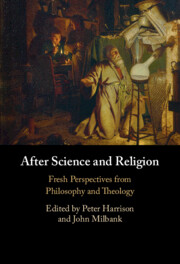Book contents
- After Science and Religion
- Reviews
- After Science and Religion
- Copyright page
- Contents
- Contributors
- Acknowledgements
- Introduction
- Part I Modern Historians on ‘Science’ and ‘Religion’
- Part II Beyond ‘Science and Religion’
- Chapter 3 Science and Theology
- Chapter 4 Religion, Science and Magic
- Chapter 5 Science, Beauty and the Creative Word
- Chapter 6 Questioning the Science and Religion Question
- Chapter 7 Truth, Science and Re-enchantment
- Chapter 8 Understanding Our Knowing
- Part III Philosophical Problems with ‘Science’ and ‘Religion’
- Part IV Before Science and Religion
- References
- Index
Chapter 8 - Understanding Our Knowing
The Culture of Representation
from Part II - Beyond ‘Science and Religion’
Published online by Cambridge University Press: 05 May 2022
- After Science and Religion
- Reviews
- After Science and Religion
- Copyright page
- Contents
- Contributors
- Acknowledgements
- Introduction
- Part I Modern Historians on ‘Science’ and ‘Religion’
- Part II Beyond ‘Science and Religion’
- Chapter 3 Science and Theology
- Chapter 4 Religion, Science and Magic
- Chapter 5 Science, Beauty and the Creative Word
- Chapter 6 Questioning the Science and Religion Question
- Chapter 7 Truth, Science and Re-enchantment
- Chapter 8 Understanding Our Knowing
- Part III Philosophical Problems with ‘Science’ and ‘Religion’
- Part IV Before Science and Religion
- References
- Index
Summary
Scientific knowledge, like other forms of knowledge, is a ‘culture’; that is, it is embedded in practices, relations and histories. The stand-off between ‘science’ and ‘religion’ has a lot to do with the failure to recognize this and with the anxiety that any concessions here will damage the truth claims of science. It is argued that a view of truthfulness that sees it as a sustainable, corrigible set of practices in coping with an environment we do not control or possess allows us to maintain a form of realism while acknowledging that there may be diverse sets of practices which legitimately embody the same principle of sustainable engagement – including the practices of traditional religious faith.
- Type
- Chapter
- Information
- After Science and ReligionFresh Perspectives from Philosophy and Theology, pp. 201 - 216Publisher: Cambridge University PressPrint publication year: 2022
- 2
- Cited by

